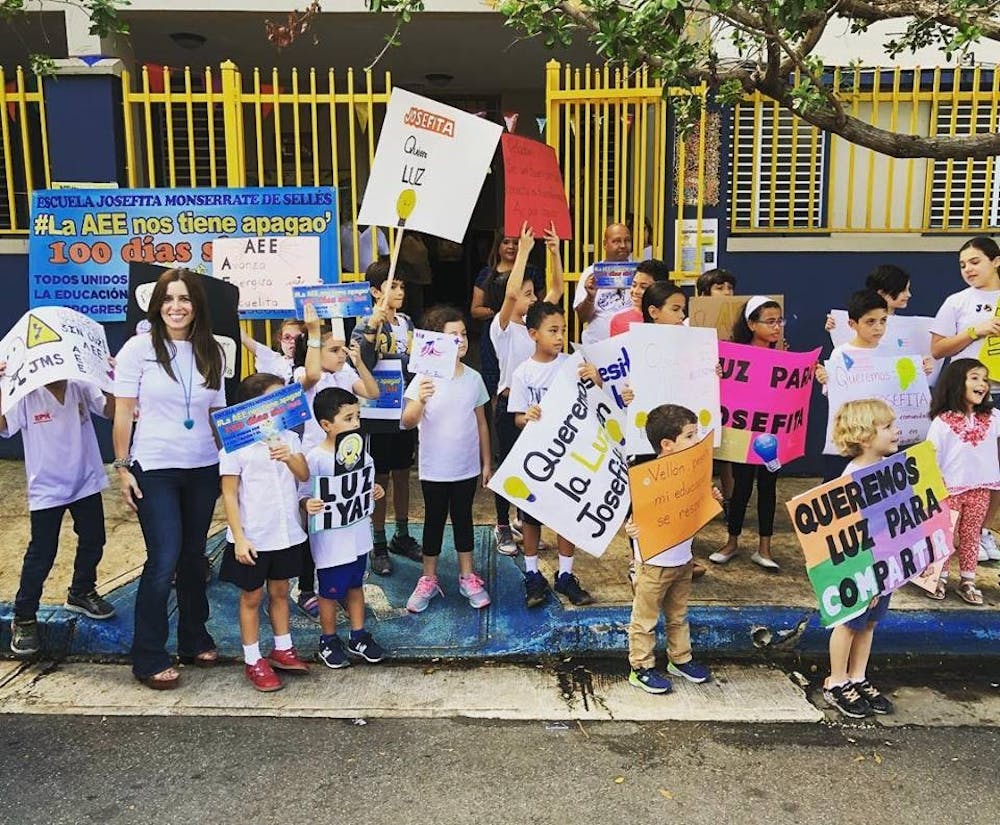More than four months have passed since Hurricane Maria hit Puerto Rico in September, leaving many without electricity, cell service and clean water. Many Puerto Rican Hopkins students returned home during the winter holidays to families who are still suffering from the effects of the storm.
Freshman Veronica Montane, a Puerto Rico native, returned home after finals and witnessed firsthand the extent of the damage Hurricane Maria caused.
She described what she saw when she returned home: toppled trees and overturned street lights smashed into buildings.
“For the most part, there’s still a lot of debris all around the island, and there are some schools and neighborhoods that have been 100 days without electricity,” she said.
For junior Nikki Lopez Suarez, who is also from Puerto Rico, going home was a bittersweet experience.
“I’ve been at Hopkins two and a half years. I feel that no matter what, home will be where my family is, and after the hurricane, it was very difficult and hard to process that the place where I grew up was unrecognizable,” she said.
It has been months since Hurricane Maria first hit Puerto Rico. The damage is still visible, though not as dramatic as it initially was, according to Montane.
“It was odd when I would mention to my mom, ‘everything is so bad,’... and she was like, ‘you didn’t see the worst of it.’ I was seeing it at its best since the storm,” Montane said.
Lopez Suarez echoed Montane’s comments and said that although her hometown was not as damaged as more rural places, it still was shocking to see the storm’s destruction.
“I live in a very metropolitan area, so obviously things weren’t as ruined compared to other places in the island, but you still see stuff like... trees pulled off the ground,” she said.
The impact of the storm has been varied across the island. Even though certain urban areas, particularly towards the north, weren’t as heavily affected, municipalities such as Morovis and other regions in central and eastern Puerto Rico suffered extensive damage.
The storm brought attention to the quality of the island’s infrastructure. Montane recalled a massive power outage last year that she believes is indicative of the structural problems facing Puerto Rico.
“When I got home, there wasn’t any power,” she said. “It was a couple of days before they got it back up and running... the infrastructure was weak before the storm hit.”
Lopez Suarez further discussed the Puerto Rican infrastructure, though she believes that the destruction was mostly due to the strength of Hurricane Maria rather than poor infrastructure.
“Frankly, the houses, if they’re made legally, are made to withstand a hurricane,” she said.
The hurricane has also deeply impacted the island’s ecosystem. Puerto Rico’s El Yunque National Forest was devastated by the hurricane, and although the rainforest itself is recovering, species such as the highly-endangered Puerto Rican Parrot face an uncertain future.
“I know the hurricane decimated the national rainforest. It’s subtle things like that that upset you,” Lopez Suarez said.
Though much of the hurricane’s observable effects were economic and physical, the hurricane also had a personal and emotional impact. Montane was still in her first semester at college when the storm hit.
“It’s hard to just be a bystander and watch it happen,” she said. “You want to be there so you can be with your family... But at the same time, no one wants you to have to go through that.”
Lopez Suarez expressed similar sentiments about the difficulty of managing academic responsibilities amid difficult familial circumstances.
“It was really hard to focus,” she said. “It’s especially hard when you feel useless, but going back wouldn’t help [your family] either, so you have to keep on studying or keep on going about your life here.”
Puerto Ricans have also dealt with disrupted telecommunications. Lopez Suarez noted that many Puerto Rican students at Hopkins were unable to call their relatives to confirm their safety.
“I was lucky; I couldn’t contact my parents for only eight hours. I knew friends who couldn’t contact their parents or their relatives for a week or two,” Lopez Suarez said.
Despite the negative effects the hurricane may have inflicted, Montane and Lopez Suarez, as well as other students, have mentioned increased solidarity and closeness within their communities as a silver lining that emerged during the difficult circumstances of the past four months.
Shortly after the disaster, many students at the University rallied to support a bake sale to raise funds for relief efforts in Puerto Rico. Senior Laura Bou Delgado, who worked with Montane to organize the bake sale, was impressed by the outpouring of support from the community.
“It was refreshing and humbling to have so many of my friends and even some who weren’t close friends at Hopkins worry and show up for me,” she wrote in an email to The News-Letter. “I’m entirely grateful.”
Montane added that the community that formed back in September has only grown closer over the last four months.
“Since we got together after the storm for the bake sale and everything, we decided to start a Puerto Rican club, so that’s one good thing that came from it,” Montane said. “We have a little group chat called ‘PR at HOP.’”
In addition, some students, like Lopez Suarez, said that Hurricane Maria made them appreciate their family and friends more.
“It puts a lot of things in perspective, but I don’t think it’s changed anything in a negative light. If anything, it gives you a sense of gratitude. Spending Christmas with my extended family was a really heart-warming experience,” Lopez Suarez said.





